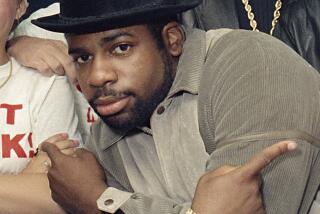Final Arguments Given in Smoking-Death Trial
- Share via
NEWARK, N.J. — Reading from dozens of confidential documents Monday in four hours of closing arguments, lawyers for the plaintiff in a smoking death trial accused three tobacco companies of engaging in an “evil-minded conspiracy . . . that callously, and with no remorse, sacrificed the lives of their loyal customers.”
Unlike Rose Cipollone, a smoker for 40 years who died of lung cancer at the age of 58, the cigarette makers made “an informed choice . . . to keep their life blood flowing at all costs,” said Marc Z. Edell, attorney for Antonio Cipollone, whose wife filed the original suit against Philip Morris, Liggett & Myers and Lorillard, makers of the brands she smoked, before she died.
Referring to more than 70 blowups of key internal documents that he mounted on an easel, Edell told the federal court jury that the cigarette makers had kept themselves deliberately ignorant of the hazards of their products, that later, when the evidence was irrefutable, they misrepresented the risks and sought to discredit factual information for medical and scientific groups.
Refers to 1930s
Edell said that the industry’s duty to do research and warn the public began in the 1930s and ‘40s, when numerous studies suggested a link between smoking and cancer and other ailments.
The industry was well aware of these studies, said Edell, referring to a 1946 letter from a Lorillard official saying that “enough evidence” had been presented of a smoker-cancer link “to justify the possibility of such a presumption.”
Edell also cited a 1954 memo showing that Liggett & Myers officials had become aware some years earlier that smoking “might be a contributory factor” in human cancer.
“Did Liggett tell Rose Cipollone?” Edell asked. “Did Liggett tell anybody else?”
The jury is scheduled to begin deliberations today in the trial, which began Feb. 1. The tobacco industry has never lost or settled a smoker death claim since the first ones were brought in the 1950s. This case has attracted wide attention because the plaintiff obtained thousands of reports, letters and strategy memos from the files of the cigarette companies, their consultants and industry organizations.
Rulings in the case have narrowed the issues almost exclusively to the industry’s conduct before 1966, when a warning label first appeared on cigarette packs by order of Congress. A federal appeals court has ruled that the law requiring the labels shields cigarette makers from most claims against them.
Pre-1966 Issue
Liggett is charged with failure to warn of the dangers of smoking before 1966 and of breaching a warranty, purportedly expressed in its ads, that its products were safe. Rose Cipollone smoked the products of Philip Morris and Lorillard after 1966. Those firms and Liggett are charged with fraudulently conspiring to misrepresent the risks of smoking.
Defense lawyers presented eight hours of closing arguments last week. But in brief rebuttals Monday, they depicted Rose Cipollone as a well-read person who made an informed choice to smoke.
“All this information” the companies supposedly withheld before 1966, “was out there in the public press,” said Donald Cohn, lawyer for Liggett & Myers. “Mrs. Cipollone had all the facts.”
Edell contended that Cipollone, who began smoking in 1942 at the age of 16, had her will and judgment so impaired by nicotine dependence that cigarette advertising and industry attacks on the health evidence helped her rationalize her habit.
‘Didn’t Believe’
Edell read to jurors from Cipollone’s deposition before she died. “I’m sure that I didn’t want to believe these warnings” on cigarette packs, Cipollone said. “I was sure that if there was anything that dangerous, that the tobacco people wouldn’t allow it and the government wouldn’t let them do it.”
The lawyer contended that an industry-wide conspiracy of silence was shattered after 1953, following an experiment in which skin cancers were induced on mice painted with concentrated tobacco tar. With the cat “out of the bag,” Edell said, the industry in 1954 announced creation of the tobacco Industry Research Committee, later renamed the Council for Tobacco Research, to finance independent research on smoking and health.
The industry maintains that the council, which has dispensed tens of millions of dollars in research grants, is evidence of its commitment to scientific truth and concern for the health of its customers.
But Edell said that the council is a tool of industry lawyers and public relations consultants, who have used it, among other things, to finance research that might be useful in defending liability suits or holding off health regulations.
More to Read
Inside the business of entertainment
The Wide Shot brings you news, analysis and insights on everything from streaming wars to production — and what it all means for the future.
You may occasionally receive promotional content from the Los Angeles Times.










